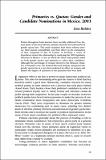| dc.description.abstract |
Parties throughout Latin America have recently addressed two distinct kinds of electoral reforms: primary elections and national-level gender quota laws. This study examines how these reforms interact, their mutual compatibility, and their effect on the nomination of men compared to that of women. It develops a series of hypotheses about this relationship by analyzing the 2003 legislative elections in Mexico, a case in which the three main parties relied on both gender quotas and primaries to select their candidates. Although the percentage of women elected to the Mexican Chamber of Deputies rose, the Federal Electoral Institute interpreted the gender quota law in a way that weakened its effect on women and limited the degree of openness in the primaries that were held. |

